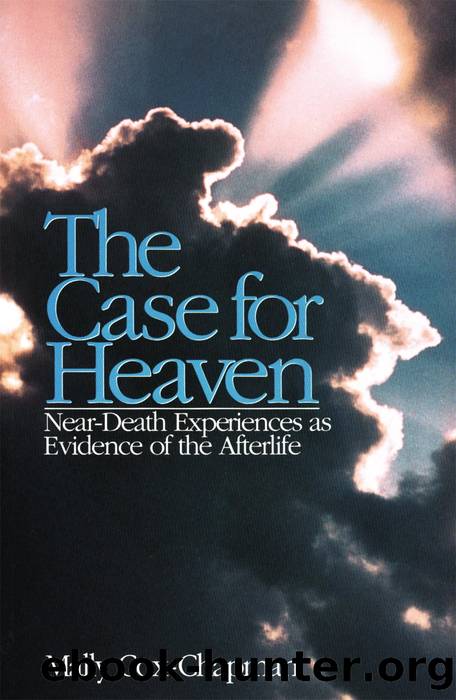The Case for Heaven, Near Death Experiences as Evidence of the Afterlife by Mally Cox-Chapman

Author:Mally Cox-Chapman
Language: eng
Format: epub
Tags: Life after death and the existence of heaven
ISBN: 1559497017
Publisher: Tide-mark
Published: 2012-12-15T00:00:00+00:00
Chapter 7
Heaven and Health Care
THE KNAVE OF HEARTS: âI donât believe thereâs an atom of meaning in it.â
THE KING: âIf thereâs no meaning in it, that saves a world of trouble, you know, as we neednât try to find any. [But] I seem to see some meaning ⦠after all.â
â LEWIS CARROLL
ALICE IN WONDERLAND
Debbie was frightened. A twenty-six-year-old with a wonderful family and a husband she loved, she should have had her whole life in front of her. Instead she had terminal lung cancer. The disease had spread. Debbie was furious at her fate and terrified of dying. Over and over she said to the nurse who was working with her that she did not want to die and she did not understand why she had been chosen to die. Nothing the nurse or her family could do or say seemed to help. The nurse described Debbie as âpetrified.â
Six months after the initial diagnosis, Debbie developed a pulmonary embolism while at home that caused cardiac arrest. She had a blissful near-death experience. She arrived at the emergency room unconcerned about her physical state and totally elated. Her NDE had erased her fear of dying. She told her physician what had happened. He responded by telling her that she had had a psychotic reaction to the medications used during her resuscitation.
Debbie was outraged that the doctor was discounting an event that was utterly real to her. Luckily, the nurse that she had been working with, Diane Corcoran, was at the hospital at the time. She was called to the emergency room. Even luckier, Corcoranâs own father had had a near-death experience and she was knowledgeable about the phenomenon. She told Debbie that her experience was a normal and natural aspect of dying. By honoring Debbieâs experience, Corcoran restored Debbieâs sense of joy at what she had learned during her near-death experience.
Debbie was transformed by the near-death experience and the affirmation she received from the nurse. She was no longer afraid of dying. She died in peace two days later.
Before she died, Debbie said something to her nurse that all health-care professionals need to hear. She said that it was deeply unfair that her health care or even the attitude toward her should be in any way compromised because of her NDE.1
With one exception, the experiencers interviewed who confided their near-death experience to a health-care professional were told that their experience was meaningless.
Imagine how this story might have unraveled if Debbie had not met nurse Corcoran, an army nurse and colonel stationed at Debbieâs hospital at the time. What would have happened if she had been told without benefit of a sympathetic nurseâas most experiencers wereâthat her near-death experience was merely a hallucination, or oxygen deprivation, or a surge of endorphins to compensate for the stress on her heart? Like many experiencers, she might have decided to keep quiet about what happened and drawn on what she learned no matter what health-care professionals said. She might have reacted by doubting herself and the experience.
Download
This site does not store any files on its server. We only index and link to content provided by other sites. Please contact the content providers to delete copyright contents if any and email us, we'll remove relevant links or contents immediately.
Spare by Prince Harry The Duke of Sussex(5197)
Tuesdays with Morrie by Mitch Albom(4784)
For Baby's Sake(4572)
Machine Learning at Scale with H2O by Gregory Keys | David Whiting(4313)
Never by Ken Follett(3957)
The Five People You Meet in Heaven by Mitch Albom(3569)
Fairy Tale by Stephen King(3399)
Reminders of Him: A Novel by Colleen Hoover(3121)
Will by Will Smith(2920)
Tuesdays With Morrie by Mitch Albom(2762)
The Clitoral Truth: The Secret World at Your Fingertips by Rebecca Chalker(2720)
Borders by unknow(2315)
Friends, Lovers, and the Big Terrible Thing by Matthew Perry(2230)
The Body Keeps the Score by Bessel van der Kolk MD(2217)
Cruel to Be Kind by Cathy Glass(2206)
The Stranger in the Lifeboat by Mitch Albom(2122)
Love on the Brain by Ali Hazelwood(2078)
Finding Chika by Mitch Albom(1968)
New Morning Mercies: A Daily Gospel Devotional by Paul David Tripp(1919)
